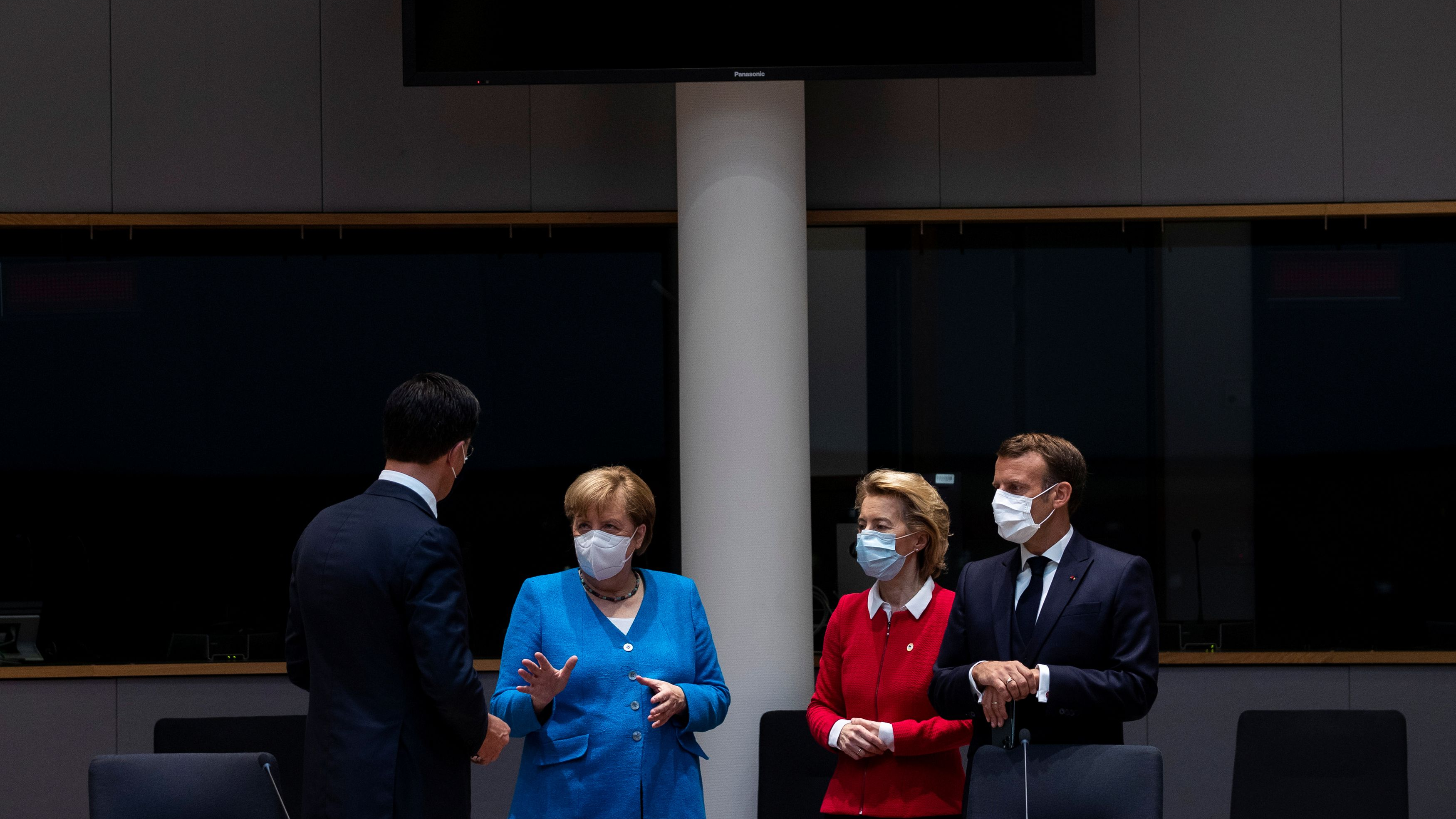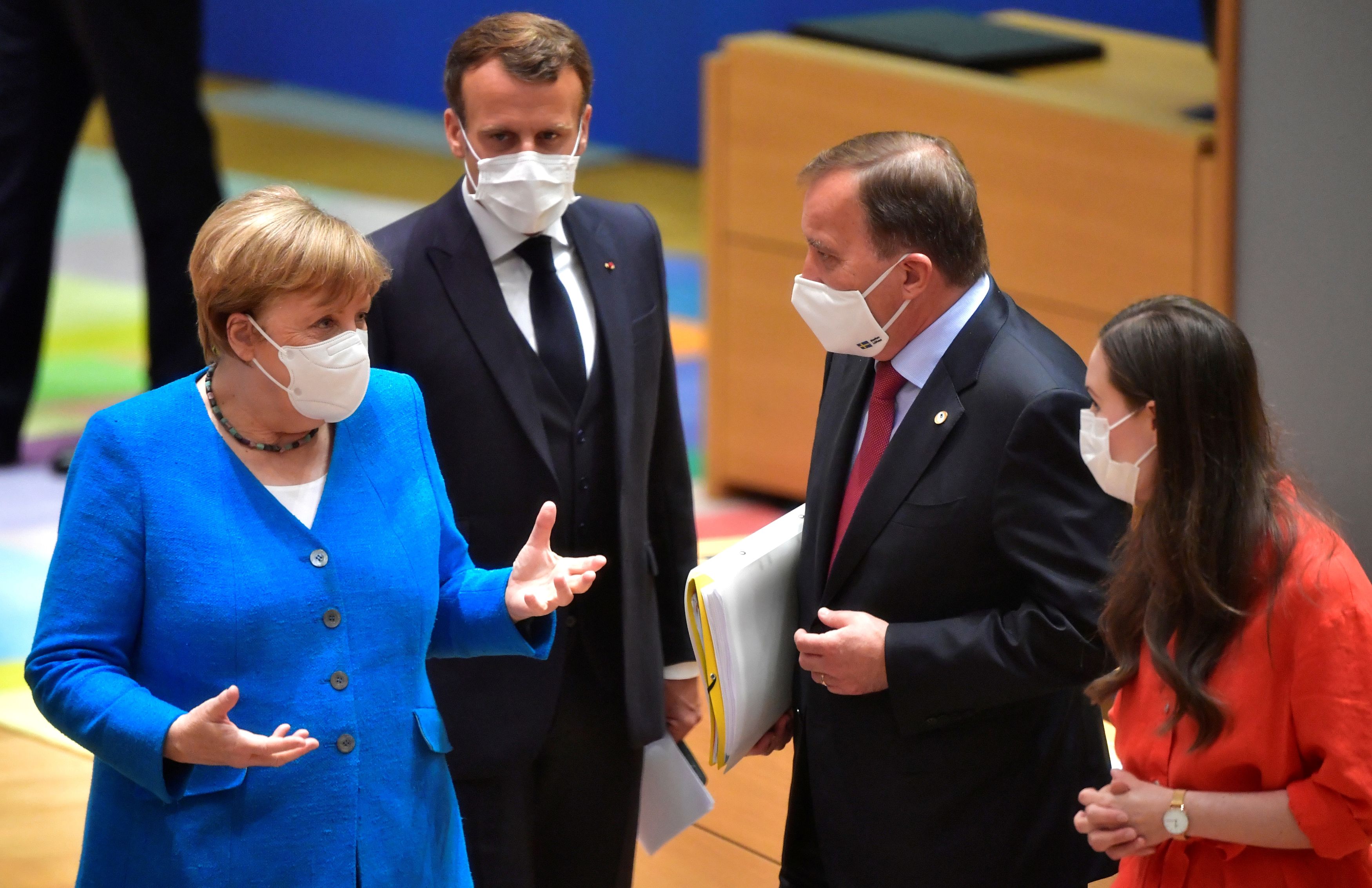
Dutch Prime Minister Mark Rutte, German Chancellor Angela Merkel, European Commission President Ursula von der Leyen and French President Emmanuel Macron during a meeting on the sidelines of the first face-to-face EU summit since the COVID-19 outbreak in Brussels, Belgium, July 18, 2020. /Reuters
Dutch Prime Minister Mark Rutte, German Chancellor Angela Merkel, European Commission President Ursula von der Leyen and French President Emmanuel Macron during a meeting on the sidelines of the first face-to-face EU summit since the COVID-19 outbreak in Brussels, Belgium, July 18, 2020. /Reuters
European Council President Charles Michel offered a revised plan for the EU's proposed economic recovery fund on Saturday in a bid to break a deadlock between the bloc's 27 leaders on the second day of a summit in Brussels. While the new proposals were welcomed by the holdout camp, they maintained that many issues are yet to be solved.
To assuage concerns by the northern camp of thrifty EU countries led by Dutch Prime Minister Mark Rutte, the share of free grants in the proposed 750 billion euro recovery fund would be reduced to 450 billion euros from 500 billion.
This, along with plans for an "emergency brake" on disbursement of funds, would appease wealthy northern states who want conditions attached to grants and would prefer to see those countries worst affected by the coronavirus crisis take loans.
The proposal would also increase rebates on the core EU budget for fiscally conservative countries such as Austria, Denmark and Sweden.
"In the end, this is a package and there are many more issues to solve. But the proposal on governance as put forward by Michel is a serious step in the right direction," a Dutch diplomat said in reaction.
"Many issues remain and whether we get there will depend on the next 24 hours."

German Chancellor Angela Merkel gestures next to France's President Emmanuel Macron, Sweden's Prime Minister Stefan Lofven and Finland's Prime Minister Sanna Marin in Brussels, Belgium, July 18, 2020. /Reuters
German Chancellor Angela Merkel gestures next to France's President Emmanuel Macron, Sweden's Prime Minister Stefan Lofven and Finland's Prime Minister Sanna Marin in Brussels, Belgium, July 18, 2020. /Reuters
The leaders of the EU held their first face-to-face summit in five months Friday in the largest room they could find at their summit center so they can keep apart as a health precaution. But it wasn't the only way in which they are far apart – they are also a long way from one another on the subject of the meeting: Plans for an unprecedented 1.85 trillion euro (2.1 trillion U.S. dollars) EU budget and recovery fund.
The first day's meeting ended fruitlessly after 12 hours of haggling as Rutte refused to give ground on his demand for strict controls on payments to his struggling southern partners.
Rutte, leading the wealthy camp of northern states including Denmark, Austria, Finland and Sweden, faced off against Germany, France, the ailing southerners Italy and Spain, as well as Poland and eastern peers.
"It is getting a bit lonelier, I'm afraid," Rutte said of Dutch insistence that any money paid out from the recovery fund first be vetted by The Hague.
"I'm doing this for the whole of Europe, because it is also in the interest of Spain and Italy that they emerge from this crisis with strength," Rutte told reporters early on Saturday, referring to the two EU countries most affected by the pandemic.
Meanwhile in currencies, the euro hovered below the four-week high it touched earlier this week, but barely budged as the European Union leaders met.
It was only in October last year that plans for a eurozone budget had been negotiated down to a meager 17 billion euro fund for competitiveness and convergence as part of the multiannual budget 2021-2027.
If no deal is reached at the summit, it is possible that more negotiations are needed over the summer, so this does not necessarily mean that a deal is out of reach.
Signs of concern would be a postponed decision to a new summit at a later date without a statement on progress, according to analysis by think tank ING THINK.
(With input from Reuters)